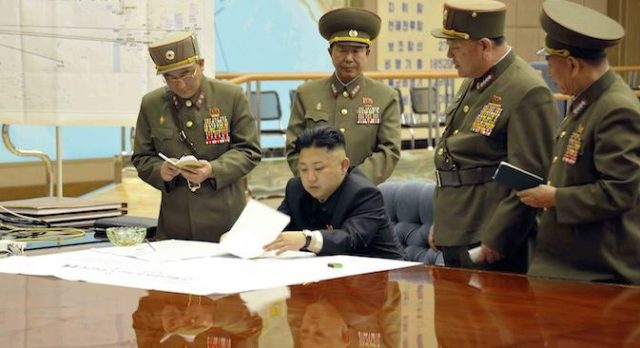
Another Russian Failure: Moscow and the Korean Question
Publication: Eurasia Daily Monitor Volume: 14 Issue: 42
By:

North Korea’s missile and nuclear programs represent a threat to all of Asia if not beyond. Yet, despite this being an issue with grave implications for Russia’s vital interests, once again Moscow is not making any constructive progress in helping to resolve it. Many pundits regularly opine, generally without evidence, that Russia and the United States have common interests, if they could only realize them. Particularly, this cited overlap frequently includes nuclear proliferation, and sometimes the case is specifically made for joint efforts on North Korea (Sputnik News, March 20). But Russian commentary on North Korea’s nuclear program and missile threat demonstrates that this is not the case (see below). In fact, Moscow has essentially surrendered any hope of a constructive role here and has subordinated its Korean policy both to China and to its global narrative of US perfidy.
Although Moscow recently reported to the United Nations that it is faithfully implementing UN sanctions on North Korea (TASS, March 10), it has just signed an agreement with Pyongyang whereby the Democratic People’s Republic of Korea (DPRK—the official name adopted by North Korea) will be able to send more of its citizens to work in Russia. Clearly, Moscow’s primary concern is “to keep the line open to Pyongyang in the belief that only in this way will Russia be included in international processes around Korea” and that it will supposedly have leverage over North Korea (Pravda.ru, March 21). Yet, in fact, Moscow appears to have no leverage and is certainly not prepared to blame Pyongyang for its reckless missile and nuclear programs. So for example, after North Korea’s March 6 missile launch, Russia’s foreign ministry called on “all parties” to exercise restraint (Mid.ru, March 15). This was merely the latest in a series of such statements going back several years, whenever the DPRK carries out one of its nuclear or missile tests.
Even though the threat of war around North Korea puts Russia’s entire East Asian policy at risk and, as Moscow well knows, could drag it into a conflict with the US on behalf of other parties and not its own interests, it continues to denounce Washington as being largely responsible for the crisis (see EDM, May 7, 2014). Moreover, in doing so, it belittles Japan and South Korea’s legitimate desires to defend themselves by deploying the US Terminal High-Altitude Air Defense (THAAD system) against the DPRK (see EDM, July 22, 2016). For example, in the recent 2+2 Russo-Japanese talks, Foreign Minister Lavrov claimed, “We drew the attention of our Japanese partners to the serious risks entailed in the development of American anti-missile defense. The further pumping up of the region with arms is a disproportionate response to North Korea’s actions in the military sphere” (Rossiyskaya Gazeta, March 20).
Thus, according to Moscow, the self-defense measures taken by Japan and South Korea in response to China and Russia’s failure to use their so-called leverage on North Korea and to maintain full sanctions is the reason for the threats in the area—not Pyongyang’s provocative behavior. Almost certainly, such a posture will not win Moscow any acclaim from Tokyo or Seoul. And the fact that Beijing and Moscow have agreed on “countermeasures” against THAAD (Japan Times, January 13) indicates that Russia has adopted the idea that these systems somehow threaten its missiles and China’s. In truth, however, that assessment, like many other Russian threat assessments, is unlikely to be true. Indeed, Russian officials not only regularly insist that THAAD is a threat to their country’s strategic stability but, also as Lavrov indicated, they judge the missile defense system to be either excessive or irrelevant vis-à-vis the North Korean threat (TASS, March 7).
So what does Moscow propose as an appropriate solution to the problems posed by the DPRK’s nuclear and missile programs? Here, there is effectively no answer. Even though Russia fully understands the nature of the North Korean regime, Moscow nevertheless believes that the threat posed by Pyongyang is merely a pretext for Washington’s activities in the region. In other words, Russia has not only bought into China’s leadership on North Korea, but it also accuses the United States of disingenuously using the threat in East Asia to pursue its global interests. As such, Russia essentially cannot and will not propose anything of interest to its regional interlocutors on Korea.
Admittedly, the problem is hideously complex; but if Russian analysts maintain that Korea is the key that opens the gate to Asia, then is it not necessary at least to try and formulate some sort of answer to the problem? The absence of anything other than complaints against Washington reveals once again that, for all the talk of Moscow’s vigorous policies in Asia, Vladimir Putin’s government cannot bring itself to address Asian problems in an Asian context or to address or acknowledge its potential partners’ vital interests and concerns. And as long as that is the case, not only will Russia be unable to play a role commensurate with its aspirations in Korea, but the largest country in the world will continue to be marginalized in Asia.



